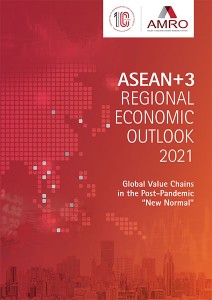Saving globalization? Global value chains in East Asia after the pandemic
SHARE THIS

Watch the video recording on Facebook >>
About the event
Globalization has been key to the growth of China and East Asia in the last thirty years. However, COVID-19 has generated a wave of pessimism over the prospects of globalization. Many have argued that the pandemic is likely to shorten or restructure global value chains (GVC) as governments and multinational enterprises are pressured to bring production home or closer to home, so as to increase resilience and diversity of supply. This shift is occurring against the backdrop of the US-China technology conflict, leading to concerns over technology bifurcation and the risks that this might pose to GVCs.
In light of these changes, how will GVCs be reconfigured? What are the likely impacts on current GVCs, especially in developing Asia? How will digital technologies transform production and distribution processes? How damaging would technology bifurcation be to the global economy? And how might governments in this region position themselves for the opportunities and challenges ahead?
The event is co-hosted with ASEAN+3 Macroeconomic Research Office (AMRO) .
Speaker
Hoe Ee KHOR is Chief Economist at ASEAN+3 Macroeconomic Research Office (AMRO). He oversees AMRO’s work on macroeconomic and financial market surveillance of its member economies, which comprise 10 members of the Association of Southeast Asian Nations (ASEAN) and China (including Hong Kong), Japan and South Korea.
A renowned economist with more than 35 years of experience, prior to joining AMRO, Dr Khor was Deputy Director of the Asia and Pacific Department at the International Monetary Fund (IMF). He also served as Assistant Managing Director of the Monetary Authority of Singapore (MAS) from 2001 to 2009, where he was responsible for economic research, monetary policy, macro-financial surveillance, and international relations. Visit his personal webpage here.
Discussant
Manu BHASKARAN is a Partner of Centennial Group International and the Founding Director and Chief Executive Officer of Centennial Asia Advisors. Mr. Bhaskaran has 40 years of expertise in economic and political risk assessment and forecasting in Asia. Before joining the Centennial Group, he was Chief Economist for Asia of a leading international investment bank and managed its Singapore-based economic advisory group. Mr. Bhaskaran is a well-regarded commentator on Asian financial and economic affairs, and has regular columns in business weeklies such as the Edge in Singapore/Malaysia. He serves as Member of the Regional Advisory Board for Asia of the International Monetary Fund; Senior Adjunct Fellow, Institute of Policy Studies; Council Member of the Singapore Institute of International Affairs; and Vice-President of the Economics Society of Singapore. Mr. Bhaskaran has a Master’s degree in Public Administration from the John F Kennedy School of Government at Harvard University and a Bachelor’s degree in economics from Cambridge University. He has also qualified as a Chartered Financial Analyst. He is based in Singapore. Visit his bio webpage here.
Moderator
Donald LOW is Professor of Practice of Public Policy at HKUST and Director of the Institute. More >>
To attend the event
The event will be held online via Zoom. Upon registration, Zoom will send you a confirmation email with a unique link to join the webinar. Reminder emails will also be sent 1 day and again 1 hour in advance of the event. Please check your spam box if you cannot find them in the inbox.
Also see here for advice from the university's IT office on Zoom best practices for attendees.
The event will be recorded.
The event will be broadcast live on the Institute's Facebook page. Please "like" the page to get automatically notified once the broadcast starts.
Further Reading

ASEAN+3 Regional Economic Outlook 2021 (AREO) provides AMRO staff’s assessment of both the conjunctural and structural issues within the ASEAN+3 region, coincides with the organization’s tenth anniversary. The AREO 2021 is based on information available as of February 28, 2021. The second chapter, which typically analyzes longer-term structural issues confronting the ASEAN+3 region, looks at the related issues of global value chain (GVC) reconfiguration and technology bifurcation. It examines the forces that are reshaping GVCs going forward and what regional economies can do to take advantage of any potential reconfiguration. The chapter also discusses the new digital technologies that will transform production processes and reshape GVCs, beginning with how the pandemic has accelerated digital transformation across businesses. Read the report "ASEAN+3 Regional Economic Outlook 2021 (AREO)" >>
Get updates from HKUST IEMS







